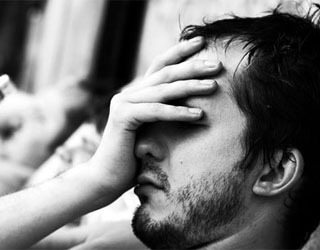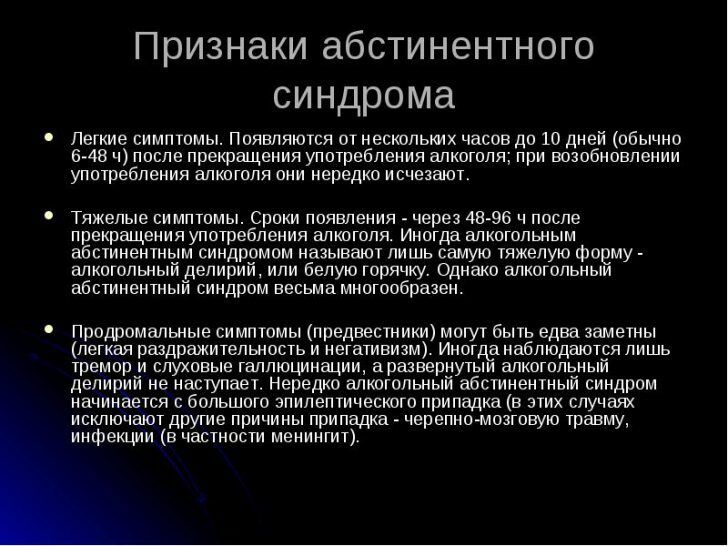Alcohol abstinence syndrome and alcohol delirium: diagnosis, symptoms, treatment
 Alcoholism, not AIDS or obesity, is the true plague of the 21st century.The incredibly high rhythm of the life of a modern megalopolis or, on the contrary, the boredom of small sleepy villages, the desire to forget about problems for a short time or, on the contrary, to be even more happy for their successes - thousands of reasons make a person consume more and more alcohol.
Alcoholism, not AIDS or obesity, is the true plague of the 21st century.The incredibly high rhythm of the life of a modern megalopolis or, on the contrary, the boredom of small sleepy villages, the desire to forget about problems for a short time or, on the contrary, to be even more happy for their successes - thousands of reasons make a person consume more and more alcohol.
Often the first glass of vodka or a glass of beer is taken in a tender enough, adolescence.And after a while, people no longer notice the boundary between just drunkenness and real dependence on the "green snake": the desire to drink becomes dominant in his behavior, and then the alcohol abstinence syndrome( AAS, withdrawal syndrome) first appears - a serious frustration for almost allFunctions of the body, unable to exist without a dose of alcohol.A sharp cessation of alcohol intake leads to the development of this condition and it is far from as safe as one might think.
Table of contents: Criteria for diagnosis of alcohol withdrawal symptoms White fever: symptoms and diagnosis Treatment of alcohol withdrawal syndromeNote: alcohol withdrawal syndrome, or withdrawal syndrome is characteristic for II and III stages of alcoholism and is considered a sign of chronic alcoholism.
| Main symptoms and syndromes | alcoholism Step | ||
| first | second | third | |
| craving for alcohol | manifested in a mild form in the presence | situations Situational and spontaneous( s struggleMotives and without it) | Compressive character |
| Decrease in quantitative control | Quantitative control falls | Quantitative control lost | LossBut the quantitative and situational control |
Diagnostic criteria for alcohol withdrawal syndrome
The withdrawal syndrome with alcohol dependence is often confused with the usual hangover - a very unpleasant condition that occurs the next morning after a plentiful libation.The symptomatology of these two phenomena is really similar.However, with the usual hangover, the signs of cancellation disappear after a few hours and never reach as much strength as with AAS.
With withdrawal syndrome due to deep organic disorders, the symptomatology of the disease can last quite a long time. Diagnosis of alcohol withdrawal syndrome is carried out by identifying at least three of the following:
- nausea with vomiting;
- tremor( trembling) of the tongue, outstretched hands, eyelids;
- increased sweating;
- increased heart rate, increased blood pressure figures;
- psychomotor agitation;
- headaches;
- sleep disorders in the form of insomnia;
- malaise, weakness;
- fast enough hallucinations:
- visual in the form of cobwebs, threads, snakes, worms, less often - revived dead, fantastic characters, monsters;
- tactile in the form of a sensation of creeping crawl, snakes, sticking cobwebs, etc.;
- auditory in the form of voices, extraneous noise;
- convulsive seizures.
 In contrast to the usual hangover, in which there is a large part of these symptoms, with AAS, they occur between 6-48 hours after the last use of alcohol and can last 2-21 days.
In contrast to the usual hangover, in which there is a large part of these symptoms, with AAS, they occur between 6-48 hours after the last use of alcohol and can last 2-21 days.
Important : is the main criterion by which the alcohol withdrawal syndrome and the usual hangover are distinguished - an irresistible craving for "oposhmelu", expressed in people in the AAS state.In this and the insidiousness of alcoholism - a person who removes the phenomenon of withdrawal by a dose of alcohol, even gets deeper into his illness, unable to realize it.It is for this reason and it is extremely difficult to cope with this pathology.
White fever: symptoms and diagnosis
White fever( alcohol delirium) is an extremely difficult condition, which can be triggered by the sudden cancellation of alcohol.With this form of alcohol abstinence syndrome, the patient becomes socially dangerous, can harm himself and others.![Belgeselgunlugu [1]](/f/4f/af/4faf6beed09e3eee225599ce0ba55be4.jpg) The main clinical signs of white fever are the brightest hallucinations, at first only visual, and then auditory, and tactile.A person can lose the ability to navigate in time and space, ceases to recognize close people.Not every form of white fever is accompanied by the aggressive behavior of the patient, but it is impossible to predict in advance whether he will destroy everything or, conversely, hide from the devils only visible to him.
The main clinical signs of white fever are the brightest hallucinations, at first only visual, and then auditory, and tactile.A person can lose the ability to navigate in time and space, ceases to recognize close people.Not every form of white fever is accompanied by the aggressive behavior of the patient, but it is impossible to predict in advance whether he will destroy everything or, conversely, hide from the devils only visible to him.
Note : it is very important to carry out differential diagnostics of alcoholic delirium and delirious disorders caused by acute intoxication with drugs with a cholinolytic effect( for example, diphenhydramine), stimulants( cocaine, zfedrin, etc.), volatile organic substances, infectious diseases, Fever, etc.
| White Heat in alcohol dependence | White Heat intoxication | |
| Anamnez | Prolonged systematic alcohol abuse, symptoms of alcohol dependence | epidemiological history information prodrome infectious disease Surgical pathology Substance abuse( stimulants, volatileOrganic matter, anticholinergics) |
| Clinical data | No feature:
| Symptoms of psychoactive substance intoxication Infectious disease Acute surgical pathology High temperature |
| Laboratory data | Signs of alcoholic liver damage( increased level of liver enzymes), chronic intoxication( increased ESR, relative leukocytosis) | Definition of psychoactiveSubstances in biological media. Identification of an infectious agent. Signs of a surgical pathology( for example, a high level of ailazy in acute pancreatitis) |
treatment of alcohol withdrawal syndrome
In society there is an incorrect opinion that the withdrawal symptoms are mistaken for a hangover is not very much and it is dangerous.However, as noted above, this method of getting out of withdrawal is the way to the abyss. Alcohol abstinence itself can lead to very unpleasant consequences:
- hypertensive crisis;
- seizure disorder;
- edema of the brain;
- stroke, etc.
And the extra "pile" only pushes the onset of these serious problems in time.That is why every patient with alcoholism in the state of withdrawal symptoms should be cured.Alcoholism is treated by narcologists, and if they are not, then resuscitators or therapists( sometimes psychiatrists).First and foremost, physicians take measures to remove the remnants of alcohol from the body as soon as possible.
For mild forms of abstinence, intravenous infusion of saline solutions and diuretics is used.At more severe because of the risk of cerebral edema, colloidal solutions, such as haemodesis, are added.At the same time, tranquilizers, some types of neuroleptics and antidepressants are used.Vitamin complexes play an important role in eliminating metabolic disorders.They are injected into the acute phase of the disease.Thiamine, riboflavin, pyridoxine, cyanocobalamin, ascorbic acid are used.These drugs help improve metabolism, reduce the likelihood of delirium and alcoholic encephalopathy.
Correction of electrolyte shifts by the appointment of intravenous forms of magnesium and potassium salts is considered mandatory.This supports the cardiac muscle and reduces the risk of convulsive seizures.It is worth remembering that eliminating the phenomena of abstinence does not relieve a person from alcohol dependence.Patients very feebly remember how they were ill, so they may again go into drinking and again through time to feel all the "charms" of the withdrawal syndrome.Only long-term professional treatment of alcoholism, appointed and controlled by a narcologist, gives the alcoholic a chance to get rid of addiction and again become what he once was - a man.More information about withdrawal syndrome, alcoholic delirium, you can get by watching this video:
Bozbey Gennady, medical columnist, ambulance doctor



